一般现在时与现在进行时的区别习题纸 黑白版(22)
初一英语一般现在时与现在进行时区别单选题30题

初一英语一般现在时与现在进行时区别单选题30题1.She usually ______ her homework after school. But now she ______ a book.A.does;is readingB.do;readsC.does;readsD.do;is reading答案:A。
“usually”表明通常情况,用一般现在时,主语是she,谓语动词用does;“now”表明现在正在进行的动作,用现在进行时be doing 结构,所以是is reading。
2.My father often ______ newspapers in the morning. But this morning he ______ breakfast.A.reads;is havingB.read;hasC.reads;hasD.read;is having答案:A。
“often”表明经常发生的动作,用一般现在时,主语是my father,谓语动词用reads;“this morning”特定的现在时间,用现在进行时,be doing 结构,所以是is having。
3.We ______ English class every day. But now we ______ an English song.A.have;are singingB.has;singC.have;singD.has;are singing答案:A。
“every day”每天,用一般现在时,主语是we,谓语动词用have;“now”现在,用现在进行时,be doing 结构,所以是are singing。
4.The students usually ______ to school by bus. But today they ______ on foot.A.go;are goingB.goes;goC.go;goD.goes;are going答案:A。
一般现在时和现在进行时练习题(含答案)

一般现在时和现在进行时练习题(含答案)编辑整理:尊敬的读者朋友们:这里是精品文档编辑中心,本文档内容是由我和我的同事精心编辑整理后发布的,发布之前我们对文中内容进行仔细校对,但是难免会有疏漏的地方,但是任然希望(一般现在时和现在进行时练习题(含答案))的内容能够给您的工作和学习带来便利。
同时也真诚的希望收到您的建议和反馈,这将是我们进步的源泉,前进的动力。
本文可编辑可修改,如果觉得对您有帮助请收藏以便随时查阅,最后祝您生活愉快业绩进步,以下为一般现在时和现在进行时练习题(含答案)的全部内容。
区别一:现在进行时强调目前正在进行的动作,而一般现在时强调经常性或习惯性的动作。
如:I’m reading a story now。
我在看一个故事.(目前正在干的事情)I read stories in my spare time。
我有空时看故事。
(经常性的行为)区别二:现在进行时强调现阶段一直在进行的动作,而一般现在时只表动作的重复,而不表示动作的持续。
如:What are you doing these days? 这几天你在干什么?They are learning English in the summer holiday. 他们暑假在学英语。
They read English every day。
他们每天读英语.They play volleyball every Sunday. 他们每周星期天都打排球。
区别三:某些表示希望或想法的动词(如hope, wonder, want等)的进行时可以表示委婉客气。
如:I’m hoping that you will succeed。
我正在希望你成功呢。
I'm wondering whether you can help us now。
我不知道你现在能否给我们帮一忙。
一般现在时和现在进行时练习题一、选择题练习1. Who _____ over there now?A。
一般现在时与现在进行时的比较与练习

一般现在时与现在进行时的比较与练习【概念不同一般现在时:一般现在时表经常的、习惯性的动作或现在的特征、状态。
现在进行时:现在进行时表示说话时(瞬间)正在进行的动作或目前这一阶段一直持续的状态。
【构成不同】一般现在时:一般现在时的构成有以下几种类型:1. be动词型:be 在肯定句中的形式为:am, is 或are; 在否定句中的形式为: am not, is not / isn't或are not / aren't; 在一般疑问句中,am, is 或are要放在句子开头,简略答语为:Yes, 主语+ am / is / are. 或No, 主语+ am not / isn't / aren't. 例如:—Are you a teacher? 你是一名教师吗?—Yes, I am. / No, I'm not. 是的,我是。
/ 不,我不是。
2. 情态动词型:句子中的谓语动词由“情态动词+ 动词原形”构成。
例如:I can sing in English. 我可以用英语唱歌。
3. 祈使句型:无论是肯定形式的祈使句,还是否定形式的祈使句,通常用一般现在时。
例如:Sit down, please. 请坐。
Don't worry. 别担心。
4. 实义(行为)动词型:在肯定句中,句子的谓语动词是实义(行为)动词的原形或第三人称单数形式。
例如:He has something important to do. 他有一些重要的事情要做。
在否定句中,句子的谓语动词由“助动词do / don't或does / doesn't + 动词原形”构成。
例如:He doesn't watch TV in the evening. 他晚上不看电视。
在一般疑问句中,句子的谓语动词仍由“助动词do或does ... + 动词原形”构成。
例如:Does Jack leave home at seven? 杰克是7点离开家的吗?现在进行时:现在进行时由“助动词be ( am, is /are ) + 动词的现在分词” 构成。
一般现在时和现在进行时区别及习题

二,用括号内所给动词的适当形式填空 1.Look! The children _________(play) football on the playground. They _________(play) football every Sunday afternoon. 2.Han Meimei ______(like) watching TV. She ______( watch) TV every evening. But now she_______( not watch) TV. She_______( get) ready for her exam.
一般现在时与现在进行时的区别
一,一般现在时 1.概念:表示经常性或习惯性的动作或状态, 或表示说话者的能力喜好,或普遍真理。 2. 标志 :often, usually, sometimes, always, never, on Sundays, every day/month/year(每一天/月/年) 3.结构 主语+实义动词 例如: I usually go to school on foot. He is very busy every day.
( )6. Don’t turn on the TV. Grandma _______ now. A. is sleeping B. will sleep C. slept D. sleeps ( )7. ---______ you ______ a book? ---Yes, I am. A. Do; read B. Are; read C. Are; reading D. Are; looking ( )8. Jenny____ English every evening. A. has study B. studies C. study D. studied ( )9. Wang Mei ____ music and now he____ to music. A. like; listen B. likes; listens C. likes; are listening D. likes ; is listening
一般现在时和现在进行时区别及习题
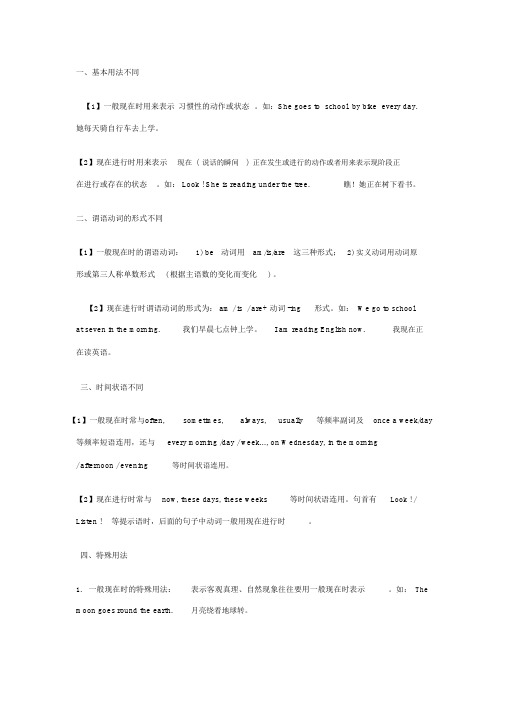
一、基本用法不同【1】一般现在时用来表示习惯性的动作或状态。
如:She goes to school by bike every day.她每天骑自行车去上学。
【2】现在进行时用来表示现在(说话的瞬间)正在发生或进行的动作或者用来表示现阶段正在进行或存在的状态。
如: Look ! She is reading under the tree.瞧!她正在树下看书。
二、谓语动词的形式不同【1】一般现在时的谓语动词:1) be动词用am/is/are这三种形式;2) 实义动词用动词原形或第三人称单数形式( 根据主语数的变化而变化) 。
【2】现在进行时谓语动词的形式为:am / is / are+ 动词 -ing形式。
如:We go to schoolat seven in the morning.我们早晨七点钟上学。
I am reading English now.我现在正在读英语。
三、时间状语不同【1】一般现在时常与o ften, sometimes, always, usually等频率副词及once a week/day 等频率短语连用,还与every morning /day / week..., on Wednesday, in the morning/ afternoon / evening等时间状语连用。
【2】现在进行时常与now, these days, these weeks等时间状语连用。
句首有Look ! / Listen !等提示语时,后面的句子中动词一般用现在进行时。
四、特殊用法1.一般现在时的特殊用法:表示客观真理、自然现象往往要用一般现在时表示。
如:The moon goes round the earth.月亮绕着地球转。
2.现在进行时的特殊用法:现在进行时与always连用时,往往含有赞扬、厌恶、责备等感情色彩。
如: He is always working hard.他总是非常努力地工作。
初一英语一般现在时与现在进行时区别单选题30题
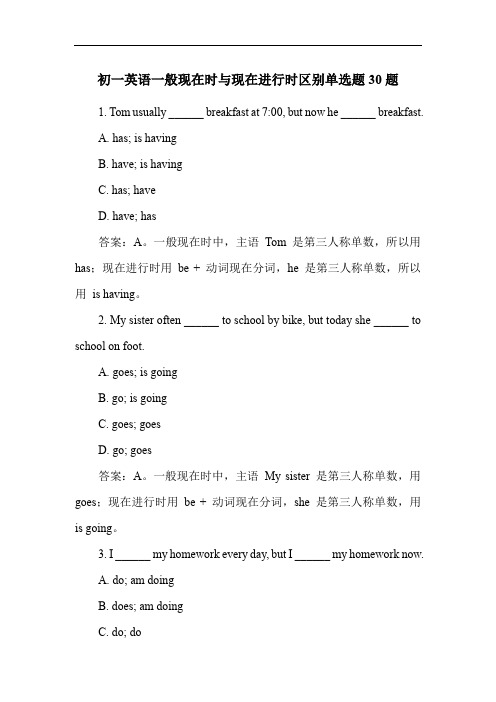
初一英语一般现在时与现在进行时区别单选题30题1. Tom usually ______ breakfast at 7:00, but now he ______ breakfast.A. has; is havingB. have; is havingC. has; haveD. have; has答案:A。
一般现在时中,主语Tom 是第三人称单数,所以用has;现在进行时用be + 动词现在分词,he 是第三人称单数,所以用is having。
2. My sister often ______ to school by bike, but today she ______ to school on foot.A. goes; is goingB. go; is goingC. goes; goesD. go; goes答案:A。
一般现在时中,主语My sister 是第三人称单数,用goes;现在进行时用be + 动词现在分词,she 是第三人称单数,用is going。
3. I ______ my homework every day, but I ______ my homework now.A. do; am doingB. does; am doingC. do; doD. does; do答案:A。
一般现在时中,主语I 不是第三人称单数,用do;现在进行时用be + 动词现在分词,I 与am 连用,用am doing。
4. They ______ TV in the evening, but now they ______ a book.A. watch; are readingB. watches; are readingC. watch; readD. watches; read答案:A。
一般现在时中,主语They 不是第三人称单数,用watch;现在进行时用be + 动词现在分词,they 与are 连用,用are reading。
(2021年整理)一般现在时与现在进行时的区别和练习

(完整版)一般现在时与现在进行时的区别和练习编辑整理:尊敬的读者朋友们:这里是精品文档编辑中心,本文档内容是由我和我的同事精心编辑整理后发布的,发布之前我们对文中内容进行仔细校对,但是难免会有疏漏的地方,但是任然希望((完整版)一般现在时与现在进行时的区别和练习)的内容能够给您的工作和学习带来便利。
同时也真诚的希望收到您的建议和反馈,这将是我们进步的源泉,前进的动力。
本文可编辑可修改,如果觉得对您有帮助请收藏以便随时查阅,最后祝您生活愉快业绩进步,以下为(完整版)一般现在时与现在进行时的区别和练习的全部内容。
(完整版)一般现在时与现在进行时的区别和练习编辑整理:张嬗雒老师尊敬的读者朋友们:这里是精品文档编辑中心,本文档内容是由我和我的同事精心编辑整理后发布到文库,发布之前我们对文中内容进行仔细校对,但是难免会有疏漏的地方,但是我们任然希望 (完整版)一般现在时与现在进行时的区别和练习这篇文档能够给您的工作和学习带来便利。
同时我们也真诚的希望收到您的建议和反馈到下面的留言区,这将是我们进步的源泉,前进的动力。
本文可编辑可修改,如果觉得对您有帮助请下载收藏以便随时查阅,最后祝您生活愉快业绩进步,以下为〈(完整版)一般现在时与现在进行时的区别和练习〉这篇文档的全部内容。
一般现在时一般现在时的形式是以动词的原形表示的,当主语为第三人称单数时,做谓语的动词原形后要加上词尾—s or –es,其构成方式列表如下:情况构成例词一般情况词尾加—s Reads, writes以ch, sh, s, x, o结尾的词词尾加—es Teaches, washes, guesses, fixes, goes以辅音字母+Y 结尾的词变Y为I,再加—es Tries, carries但是,动词to be 和to have 的一般现在时的形式特殊如下:一般动词的词形变化 To be 的词形变化 To have 的词形变化I know it I am a student I have a pen.You know it。
现在进行时和动词一般现在时解析对比以及练习2023-2024学年七年级上册英语

现在进行时&一般现在时(知识对比讲解)一、定义对比现在进行时:★表示现在或现阶段正在进行/发生的动作或存在的状态例:I am doing homework.He is running.一般现在时:★表示经常性/习惯性/规律性/真理性的动作或存在的状态例:I usually go to school by bike.I am a teacher.二、标志词对比现在进行时的标志词:◆now◆right now◆look◆listen◆at this/the moment一般现在时的标志词:◆often/usually/always/sometimes等频率副词◆every day/night/morning等三、相关动词形式的变化规则现在进行时中,现在分词(动词加ing)的变化规则◆一般情况下,直接加ing如:sleep → sleeping look → looking◆以不发音的字母e结尾,去e,加ing如: e → ing have → having◆以重读闭音节结尾,双写尾字母,加ing如:put → putting swim → swimming runrunning shopshopping ◆特殊变化:lielying diedying一般现在时中,行为动词变三单的变化规则◆一般情况下,加s如:look → looks want → wants◆以s、x、o、ch、sh结尾,加es如:go→ goes watch → watches◆以辅音字母+y结尾,变y为i,再加es如:fly → flies study → studies◆特殊变化如:have → has四、句型结构对比现在进行时的句型结构:1> 肯定句:主语+be +动词ing +其他.如:They are running now.2> 否定句:主语+ be+not +动词ing +其他.如:They are not running now.=They aren't running now.3> 一般疑问句:Be + 主语+动词ing +其他?如:Are they running now?4> 特殊疑问句:特殊疑问词+ be +主语+动词ing +其他?如: What are they doing now?一般现在时的句型结构:第一种:含be型1> 肯定句:主语+be +其他.如:She is in the room.2> 否定句:主语+ be+not +其他.如:She is not in the room.=She isn't in the room.3> 一般疑问句:Be + 主语+其他?如:Is she in the room?4> 特殊疑问句:特殊疑问词+ be +主语+其他?如: Where is she?第二种:含实义动词型1> 肯定句:主语+动词+其他.如:I like reading.(主语I不符合三单,动词like用原形)She likes reading.(主语She符合三单,动词like变三单)即:● 肯定句中,主语三单,动词变三单。
初一英语一般现在时与现在进行时区别单选题30题

初一英语一般现在时与现在进行时区别单选题30题1.Look! The boy ______ football.A.playsB.is playingC.playD.played答案:B。
本题中“Look!”表明此刻正在发生的动作,所以要用现在进行时,be 动词+动词的现在分词形式。
A 选项是一般现在时,C 选项形式错误,D 选项是一般过去时。
2.She usually ______ breakfast at 7:30.A.hasB.is havingC.haveD.had答案:A。
“usually”表明是经常性的动作,要用一般现在时,主语she 是第三人称单数,所以动词用has。
B 选项是现在进行时,C 选项主语是第三人称单数时动词形式错误,D 选项是一般过去时。
3.Listen! Someone ______ a song.A.singsB.is singingC.sangD.will sing答案:B。
“Listen!”表明此刻正在发生的动作,要用现在进行时,be 动词+动词的现在分词形式。
A 选项是一般现在时,C 选项是一般过去时,D 选项是一般将来时。
4.He often ______ books in the library.A.readsB.is readingC.readD.will read答案:A。
“often”表明是经常性的动作,要用一般现在时,主语he 是第三人称单数,所以动词用reads。
B 选项是现在进行时,C 选项主语是第三人称单数时动词形式错误,D 选项是一般将来时。
5.They ______ TV now.A.watchB.are watchingC.watchedD.will watch答案:B。
“now”表明此刻正在发生的动作,所以要用现在进行时,be 动词+动词的现在分词形式。
A 选项是一般现在时,C 选项是一般过去时,D 选项是一般将来时。
6.Look! The students ______ games on the playground.A.playB.playsC.are playingD.is playing答案:C。
一般现在时和现在进行时练习题(含答案)
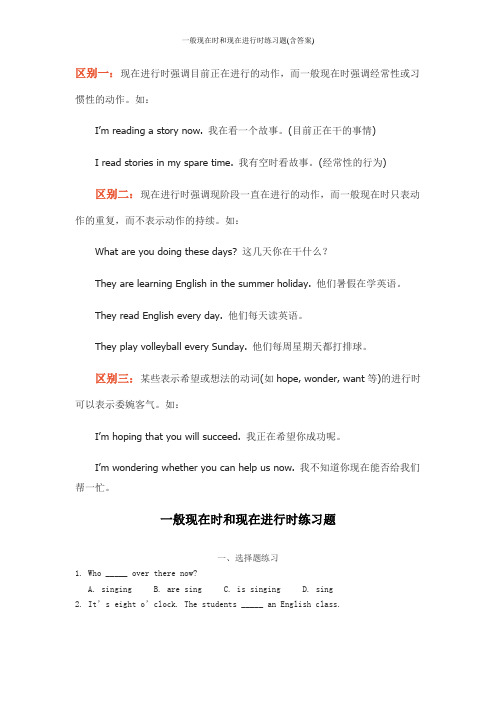
区别一:现在进行时强调目前正在进行的动作,而一般现在时强调经常性或习惯性的动作。
如:I’m reading a story now. 我在看一个故事。
(目前正在干的事情)I read stories in my spare time. 我有空时看故事。
(经常性的行为)区别二:现在进行时强调现阶段一直在进行的动作,而一般现在时只表动作的重复,而不表示动作的持续。
如:What are you doing these days? 这几天你在干什么?They are learning English in the summer holiday. 他们暑假在学英语。
They read English every day. 他们每天读英语。
They play volleyball every Sunday. 他们每周星期天都打排球。
区别三:某些表示希望或想法的动词(如hope, wonder, want等)的进行时可以表示委婉客气。
如:I’m hoping that you will succeed. 我正在希望你成功呢。
I’m wondering whethe r you can help us now. 我不知道你现在能否给我们帮一忙。
一般现在时和现在进行时练习题一、选择题练习1. Who _____ over there now?A. singingB. are singC. is singingD. sing2. It’s eight o’clock. The students _____ an English class.A. haveB. havingC. is havingD. are having3. Listen! The baby _____ in the next room.A. cryingB. criedC. is cryingD. cries4. Look! The twins _____ new sweaters.A. are wearingB. wearingC. are wearD. is wearing5. Don’t talk here. Grandparents _____.A. is sleepingB. are sleepingC. sleepingD. sleep6. Tom is a worker. He _____ in a factory. His sisters _____ in a hospital.A. work/ workB. works/ workC. work/ works7. Who _____ English best in your class?A. speakB. speaksC. speaking8. Mrs Read _____ the windows every day.A. is cleaningB. cleanC. cleans9. We _____ music and often _____ to music.A. like/ listenB. likes/ listensC. like/ are listening10. She _____ up at six in the morning.A. getB. getsC. getting11. On Sunday he sometimes _____ his clothes and sometimes _____ some shopping.A. wash/ doB. is washing/ is doingC. washes/ does12. The twins usually _____ milk and bread for breakfast, but Jim _____ some coffee for it.A. have/ haveB. have/ hasC. has/ have13.Father usually ______ his newspaper after dinner.A. readB. readsC. ReadingD. is reading14. The Blacks often ______ to the cinema on Saturday evenings.A. goB. goesC. is goingD. are going15.Look! The boy ______ with his mother in the pool.A. is swimmingB. is swimingC. are swimmingD. are swiming16.--- What is Tom doing in the classroom--He ______ something on the blackboard.A. drawsB. drawC. is drawingD. are drawing.17.Old Tom usually ______ up at six and ______ sports in the garden.A. gets, dosB. gets, doesC. get, doesD. gets, do18. It's ten o'clock and Jack ______ still(仍然) ______ his homework.A. is, doB. is, doingC. are, doD. are, doing19I ______ a letter, so I can't go out with you.A. is writingB. am writingC. am writeingD. am writting二、填空:1. My father always __________(come) back from work very late.2. The teacher is busy. He __________ (sleep) six hours a day.3. Listen! Joan __________(sing) in the classroom. She often __________ (sing) there.4. __________ your brother __________(know) Japanese?5. Where __________ you __________ (have) lunch every day?6. The girl __________(like) wearing a skirt. Look! She __________(wear) a red skirt today.三、写出下列动词的现在分词形式1. work_____ sing_____ play____ study_____2. dance_____ have____ write____ take_____3. run_____ sit____ shop____ swim____4. lie_____四、写出下列动词的第三人称单数形式1.work_____ read____ clean____ write____2.teach____ wash____ guess____ watch____3.go______ do______ photo_____4.study____ fly_____ cry____ play____。
一般现在时和现在进行时练习题(含答案)
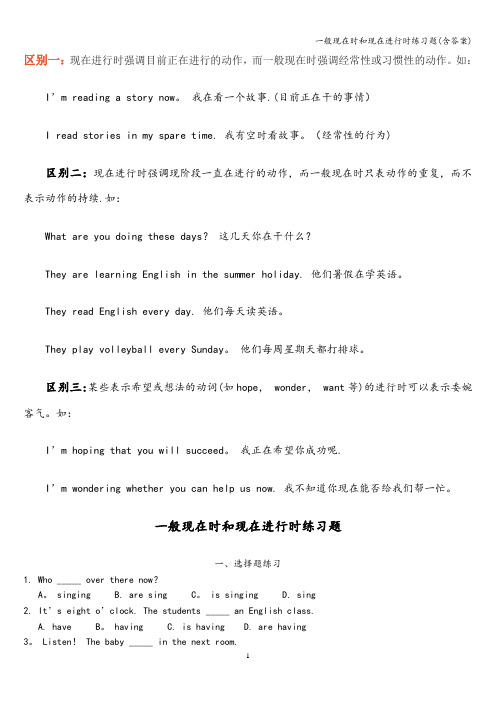
区别一:现在进行时强调目前正在进行的动作,而一般现在时强调经常性或习惯性的动作。
如:I’m reading a story now。
我在看一个故事.(目前正在干的事情)I read stories in my spare time. 我有空时看故事。
(经常性的行为)区别二:现在进行时强调现阶段一直在进行的动作,而一般现在时只表动作的重复,而不表示动作的持续.如:What are you doing these days?这几天你在干什么?They are learning English in the summer holiday. 他们暑假在学英语。
They read English every day. 他们每天读英语。
They play volleyball every Sunday。
他们每周星期天都打排球。
区别三:某些表示希望或想法的动词(如hope, wonder, want等)的进行时可以表示委婉客气。
如:I’m hoping that you will succeed。
我正在希望你成功呢.I’m wondering whethe r you can help us now. 我不知道你现在能否给我们帮一忙。
一般现在时和现在进行时练习题一、选择题练习1. Who _____ over there now?A。
singing B. are sing C。
is singing D. sing2. It’s eight o’clock. The students _____ an English class.A. have B。
having C. is having D. are having3。
Listen! The baby _____ in the next room.A. crying B。
cried C。
is crying D。
cries4。
Look! The twins _____ new sweaters.A. are wearingB. wearingC. are wearD. is wearing5。
一般现在时与现在进行时区别与专项练习

一般现在时与现在进行时区别与专项练习一、概念:一般现在时表示经常性或习惯性的动作或存在的状态,或表示说话者的能力,或普遍真理。
例如:We read English every day.我们每天读英语。
现在进行时表示正在进行的动作,也表示目前阶段一直进行的动作。
例如:We are reading English now.现在我们正在读英语。
二、标志词:一般现在时的时间状语主要有:sometimes,often,usually,always,every day等。
例如:We often play basketball after school.我们经常放学后打篮球。
现在进行时的时间状语有:now,thesedays 等。
如果以动词look,listen开头,后面也需用现在进行时。
例如:They are writing in the classroom now.他们正在教室里写字。
Listen!The boy is crying.听!那个男孩在哭。
三、构成一般现在时的构成由动词本身体现出来,但实义动词的否定句和疑问句必须借助于助动词do的适当形式体现。
例如:I get up early every morning.一.用动词的适当形式填空1. She _________(go) to school at seven o’clock.2. It’s 6 o’clock. They are _________ (eat) supper.3. He usually ___________ up at 17:00.(get )4. She ___________ (live) in Beijing.5. Amy _________ (be) here just now.6. _______ (be) there a pear on the table just now?7. My father __________ (watch) TV every evening .8. My father _______________ (make) toys these days.9.________ Amy _________ (read) English every day10. Chen Jie sometimes _________(go)to the park with her sister.二.选择填空1.I want____homework now.A. doingB. to doC. to do myD. do my2.It's time______.A. go to schoolB. play gamesC. to go homeD. to do my homeworks3.____ you____the blackboard? Yes,I am.A. Can, cleanB. Am, cleaningC. Are, cleaningD. Do clean4.______go and help her.A. Let's meB. Let's usC. Let'sD. Let's to5.What are they doing? They are______things away.A. putB. putingC. puttingD. carry6.Do they have a new car? Yes,_____.A .they are B.they have C. they don't D. they do 7.He often _________ supper at 6:00 in the evening.A. haveB. has c. is having D. is eating8. It’s 6 o’clock in the morning. He ___________.A. get upB. gets upC. is geting upD. is getting up9. What are you doing? I’m __________ TV.A. watchB. watchesC. to watchD. watching10. We _____________ any Chinese classes on Friday.A. are havingB. aren’t havingC. don’t haveD. are have11. Tom _______ an English class now.A. is havingB. hasC. havingD. have12. Are you playing basketball? No, we ___________.A. isn’tB. aren’tC. notD. don’t13. Listen! The girl _____________ in the room.A. singsB. singingC. is singingD. are singing14. The boy is __________ to his teacher.A. sayingB. speakingC. talkingD. telling15. Look! Their teachers volleyball.A.playingB.are playingC.is playingD.play三、用括号内动词的适当形式填空。
初一英语一般现在时与现在进行时区别完形填空题30题

初一英语一般现在时与现在进行时区别完形填空题30题11. I am in the classroom now. I ___ listening to the teacher.A. amB. isC. areD. be答案:A。
解析:现在进行时的结构是be + doing,主语是I,所以be 动词用am。
2. My mother usually ___ breakfast for me.A. cookB. cooksC. cookingD. is cooking答案:B。
解析:usually 表示通常,是一般现在时的标志词。
主语是my mother 第三人称单数,所以动词要用三单形式cooks。
3. Look! The boys ___ football on the playground.A. playB. is playingC. are playingD. plays答案:C。
解析:Look!是现在进行时的标志词。
主语是the boys 复数,所以be 动词用are,play 要用现在分词playing。
4. My sister ___ her homework every day.A. doB. doesC. doingD. is doing答案:B。
解析:every day 是一般现在时的标志词。
主语是my sister 第三人称单数,所以动词要用三单形式does。
5. Listen! Someone ___ singing in the next room.A. isB. areC. amD. be答案:A。
解析:Listen!是现在进行时的标志词。
someone 作主语时,谓语动词用单数形式,所以be 动词用is。
6. I often ___ books in the evening.A. readB. readsC. readingD. am reading答案:A。
解析:often 表示经常,是一般现在时的标志词。
一般现在时和现在进行时的区别与练习
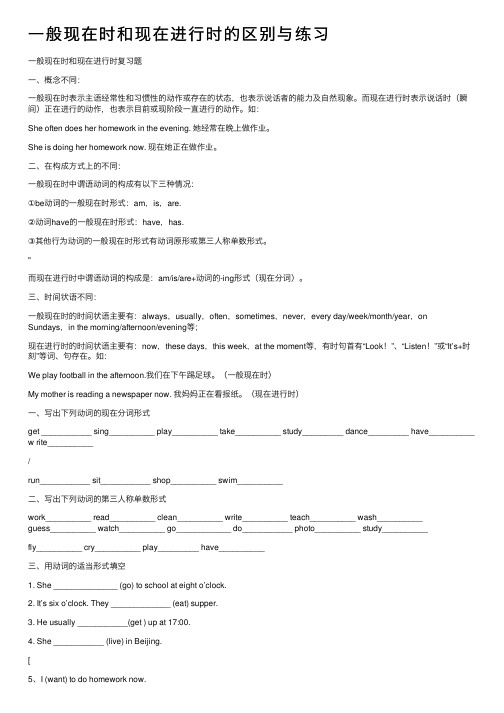
⼀般现在时和现在进⾏时的区别与练习⼀般现在时和现在进⾏时复习题⼀、概念不同:⼀般现在时表⽰主语经常性和习惯性的动作或存在的状态,也表⽰说话者的能⼒及⾃然现象。
⽽现在进⾏时表⽰说话时(瞬间)正在进⾏的动作,也表⽰⽬前或现阶段⼀直进⾏的动作。
如:She often does her homework in the evening. 她经常在晚上做作业。
She is doing her homework now. 现在她正在做作业。
⼆、在构成⽅式上的不同:⼀般现在时中谓语动词的构成有以下三种情况:①be动词的⼀般现在时形式:am,is,are.②动词have的⼀般现在时形式:have,has.③其他⾏为动词的⼀般现在时形式有动词原形或第三⼈称单数形式。
"⽽现在进⾏时中谓语动词的构成是:am/is/are+动词的-ing形式(现在分词)。
三、时间状语不同:⼀般现在时的时间状语主要有:always,usually,often,sometimes,never,every day/week/month/year,on Sundays,in the morning/afternoon/evening等;现在进⾏时的时间状语主要有:now,these days,this week,at the moment等,有时句⾸有“Look!”、“Listen!”或“It’s+时刻”等词、句存在。
如:We play football in the afternoon.我们在下午踢⾜球。
(⼀般现在时)My mother is reading a newspaper now. 我妈妈正在看报纸。
(现在进⾏时)⼀、写出下列动词的现在分词形式get ___________ sing__________ play__________ take__________ study_________ dance_________ have__________ w rite__________/run___________ sit___________ shop__________ swim__________⼆、写出下列动词的第三⼈称单数形式work__________ read__________ clean__________ write__________ teach__________ wash__________guess__________ watch__________ go____________ do___________ photo__________ study__________fly__________ cry__________ play_________ have__________三、⽤动词的适当形式填空1. She ______________ (go) to school at eight o’clock.2. It’s six o’clock. They _____________ (eat) supper.3. He usually ___________(get ) up at 17:00.4. She ___________ (live) in Beijing.[5、I (want) to do homework now.6、My father always __________(come) back from work very late.7、The teacher is busy. He __________ (sleep) six hours a day.8、Listen! Jane __________(sing) in the classroom. She often _________ (sing) there.9、__________ your brother __________(know) Japanese10、Where __________ you __________ (have) lunch every day11、The girl _____(like) wearing a skirt. Look! She ______ __(wear) a red skirt today.12、It's time______ (go) to school13、______you______(clean)the blackboard now14、Let's ______(go)and help her.》15、What are they doing They ___________(put)things away.16、He often _________ (have)supper at 6:00 in the evening.17、It’s 6 o’clock in the morning. He ___________.(get)up.18、Tom _________ (have) an English class now.13. Listen! The girl _____________(sing)in the room.14. I ___________(read)a book in the room at the moment.16. Where _________ he _________ (come)from17. Who ________(sing)over there now18、Listen! The baby ________(cry)in the next room.19、Look! The twins (wear)new sweaters.】20、Don’t talk here. Grandparents __________ _ (sleep).21、Mrs Read _________(clean)the windows every day.22.、On Sunday he sometimes _______(wash)his clothes and sometimes ________(do)some shopping.23、The twins usually ____ (have)milk and bread for breakfast, but Jim _____ (have)some coffee for it.24、---What ______ you ______ (do) ---I _______ (make) cakes.25、Sometimes she ________ (watch) TV.26、Now she _________ (watch) TV. Jim, my good friend, ______ (be) sixteen years old.27、There ______ (be) some books and pens on the desk.28、Mrs White ______ (teach) English. She ________ (teach) English now.29、---______ you ______ (make) a model plane ---Yes, I am.*30、---How ______ you ______ (like) China ---I ______ (like) China very much。
现在进行时与一般现在时有何区别

现在进行时与一般现在时有何区别在英语学习的过程中,时态是非常重要的一部分,而现在进行时和一般现在时是两个常见且基础的时态。
理解它们之间的区别,对于正确使用英语、准确表达意思至关重要。
一般现在时主要用于表示经常发生的动作或存在的状态,具有习惯性、规律性和普遍性。
比如说,“I go to school by bike every day”(我每天骑自行车去上学。
)这里的“go”就是一般现在时,表明“去上学”这个动作是日常的、有规律的。
再比如,“She likes music”(她喜欢音乐。
)“likes”表示一种常态的喜好。
现在进行时则强调正在进行的动作,即在说话的当下这个动作正在发生。
例如,“I am reading a book now”(我现在正在读一本书。
)“am reading”清晰地表明了“读书”这个动作正在进行。
从时间状语上来看,一般现在时常与“always”(总是)、“often”(经常)、“sometimes”(有时)、“never”(从不)、“everyday/week/month/year”(每天/每周/每月/每年)等表示频率的词或短语连用。
而现在进行时通常会有“now”(现在)、“at the moment”(此刻)、“right now”(马上)等时间状语。
在动词形式上,一般现在时中,当主语是第三人称单数时,动词要进行相应的变化,比如在词尾加“s”或“es”。
而现在进行时的构成是“be动词(am/is/are)+动词的现在分词(ing 形式)”。
从表达的意义和功能上来说,一般现在时还可以用来陈述客观事实、真理和自然现象等。
比如,“The earth moves around the sun”(地球绕着太阳转。
)这是一个客观事实,无论何时都是成立的,所以用一般现在时。
现在进行时除了表示正在进行的动作,有时还可以表示现阶段正在进行但不一定是此刻正在发生的动作。
例如,“He is writing a novel these days”(这些天他在写一本小说。
- 1、下载文档前请自行甄别文档内容的完整性,平台不提供额外的编辑、内容补充、找答案等附加服务。
- 2、"仅部分预览"的文档,不可在线预览部分如存在完整性等问题,可反馈申请退款(可完整预览的文档不适用该条件!)。
- 3、如文档侵犯您的权益,请联系客服反馈,我们会尽快为您处理(人工客服工作时间:9:00-18:30)。
B)Fill in the blanks with“Simple Present or Present Continuous”1)Gina _____________ ( be ) so ill that she_____________ ( look ) like a ghost.2)“_____________ ( you – believe ) in ghosts?” “No, I__________.”3)The kids _____________ ( have ) great time at picnics.They _____________ ( fly ) their kites, _____________ ( skip ) rope. It _________ ( be ) so beautiful for them.4)I _____________ ( like ) spending time with myfamily. My father _____________ ( teach ) me how to play chess, I _____________ ( help ) my mother with the housework, we _____________ ( go ) out with my sisters. Our grandparents _____________ ( visit ) us at the weekends.5)Tonight is very different for our family. My father never_____________ ( watch ) TV before dinner but now he _____________ ( watch ) TV. My mother ____________ ( cook ) fish but nobody_____________ ( eat ) fish in our family. It ________ ( be ) a strange night.6)Normally cats _____________ ( drink ) milk but my cat_____________ ( hate ) milk.7)“What _____________ ( your father - do ) in thegarden?” “He _____________ ( cut ) down the trees. He _____________ ( love ) spending time in the garden.”8)“What _____________ ( you – do ) ?” “I’m a teacher.”9)Be careful! The car _____________ ( come ) towardsyou.A)Choose the correct one1)My mother usually is going / goes to shopping with myaunt.2)Susan is watering / waters the flowers at the weekends.3)We are having / have great time. Why don’t you join us?4)Who is wanting / wants to come with me?5)They never are helping / help us.6)My parents are visiting / visit my grandparents thisweekend.7)She sometimes is studying / studies French.8)How often are you visiting / do you visit yourgrandmother?9)“Where is your brother?” “He is washing / washesfather’s car.”10)We are happy because we are going / go to the zoo. 11)I’m very busy. I am working / work on a project.12)Jimmy is knowing / knows the facts about the old man.13)“What are you doing / do you do ?” “I am washing / wash my car.”14)The children are waiting / waitfor the bus every morning but today they are going / go by train.15)Are you helping / do you help your motherin your free times?C)Make sentences with the given words. Use the time expressions.1)Sally – go – fishing – free times ____________________________________________2)Somebody – wait – you – now ____________________________________________3)He – paint – the fences – look ____________________________________________4)Kelly – wear – red – always ____________________________________________5)Cats – chase – mouse - normally ____________________________________________6)My father – read – newspaper – in the evening ________________________________________7)The students- have – exam – right now ______________________________________________8)Dana – go – shopping – on Sundays ______________________________________________9)I – get – ready – for the party – now ______________________________________________10)She – brush – her teeth – twice a day ______________________________________________A)Choose the correct one1)My mother usually is going / goes to shopping with myaunt.2)Susan is watering / waters the flowers at the weekends.3)We are having / have great time. Why don’t you join us?4)Who is wanting / wants to come with me?5)They never are helping / help us.6)My parents are visiting / visit my grandparents thisweekend.7)She sometimes is studying / studies French.8)How often are you visiting / do you visit yourgrandmother?9)“Where is your brother?” “He is washing / washesfather’s car.”10)We are happy because we are going / go to the zoo.11)I’m very busy. I am working / work on a project.12)Jimmy is knowing / knows the facts about the old man.13)“What are you doing / do you do?” “I am washing / wash my car.”14)The children are waiting / waitfor the bus every morning buttoday they are going / go by train.15)Are you helping / do you help your motherin your free times?B)Fill in the blanks with“Simple Present or Present Continuous”1)Gina _____________ ( be ) so ill that she_____________ ( look ) like a ghost.2)“_____________ ( you – believe ) in ghosts?” “No, I__________.”3)The kids _____________ ( have ) great time at picnics.They _____________ ( fly ) their kites, _____________( skip ) rope. It _________ ( be ) so beautiful for them.4)I _____________ ( like ) spending time with myfamily. My father _____________ ( teach ) me how toplay chess, I _____________ ( help ) my mother withthe housework, we _____________ ( go ) out with mysisters. Our grandparents _____________ ( visit )us at the weekends.5)Tonight is very different for our family. My father never_____________ ( watch ) TV before dinner but now he_____________ ( watch ) TV. My mother____________ ( cook ) fish but nobody_____________ ( eat ) fish in our family. It ________ (be ) a strange night.6)Normally cats _____________ ( drink ) milk but my cat_____________ ( hate ) milk.7)“What _____________ ( your father - do ) in thegarden?” “He _____________ ( cut ) down the trees.He _____________ ( love ) spending time in thegarden.”8)“What _____________ ( you – do ) ?” “I’m a teacher.”9)Be careful! The car _____________ ( come ) towardsyou.C)Make sentences with the given words. Use the time expressions.1)Sally – go – fishing – free times ____________________________________________2)Somebody – wait – you – now ____________________________________________3)He – paint – the fences – look ____________________________________________4)Kelly – wear – red – always ____________________________________________5)Cats – chase – mouse - normally ____________________________________________6)My father – read – newspaper – in the evening ________________________________________7)The students- have – exam – right now ______________________________________________8)Dana – go – shopping – on Sundays ______________________________________________9)I – get – ready – for the party – now ______________________________________________10)She – brush – her teeth – twice a day ______________________________________________。
